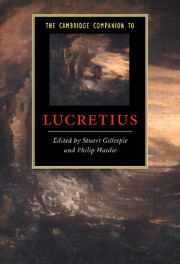Book contents
- Frontmatter
- Introduction
- Part I: Antiquity
- 1 Lucretius and Greek philosophy
- 2 Lucretius and the Herculaneum library
- 3 Lucretius and Roman politics and history
- 4 Lucretius and previous poetic traditions
- 5 Lucretian architecture: the structure and argument of the De rerum natura
- 6 Lucretian texture: style, metre and rhetoric in the De rerum natura
- 7 Lucretius and later Latin literature in antiquity
- Part II: Themes
- Part III: Reception
- Dateline
- List of works cited
- Index of Main Lucretian Passages Discussed
- General Index
3 - Lucretius and Roman politics and history
from Part I: - Antiquity
Published online by Cambridge University Press: 28 May 2010
- Frontmatter
- Introduction
- Part I: Antiquity
- 1 Lucretius and Greek philosophy
- 2 Lucretius and the Herculaneum library
- 3 Lucretius and Roman politics and history
- 4 Lucretius and previous poetic traditions
- 5 Lucretian architecture: the structure and argument of the De rerum natura
- 6 Lucretian texture: style, metre and rhetoric in the De rerum natura
- 7 Lucretius and later Latin literature in antiquity
- Part II: Themes
- Part III: Reception
- Dateline
- List of works cited
- Index of Main Lucretian Passages Discussed
- General Index
Summary
Lucretius’ de re publica
Virgil provides an eloquent, if implicit, comment on the politics of the DRN when he inserts a recognisably Lucretian expression in Anchises’ climactic speech in Aeneid 6 (851): ‘remember, Roman, your task will be to guide peoples by your rule’ (regere imperio). This engages dialectically with the very different attitude advocated by the Epicurean poet in his account of the development of societal structures: ‘it is indeed much better to obey in peace than to desire to hold the world in fee (regere imperio res) and to rule kingdoms’ (5.1129-30). The elliptic nature of the reference makes it impossible to judge whether Virgil is ‘quoting’ Lucretius in order to correct him (the emphatic tu could suggest the contrast), or whether the Lucretian flavour of regere imperio questions sous rature the ostensibly imperial teachings of Aeneas’ father. Either way, Virgil identifies in the DRN a significant political dimension and seems prepared to read in the account of evolution in Book 5 a reflection on the Romans’ philosophy of history and politics. The DRN’s ambition is indeed twofold: both to be involved (literally from the very first line) in the anxieties of a troubled age, and to teach eternal truths. Epicurean precepts possess transhistorical validity, but can also help here and now to make sense of Rome’s stormy politics, rooted in the structural malaise of a society which has long lost any sense of ‘what Nature barks for’ (2.17) and of the natural aequum which in a distant past allowed communities to lead a carefree life.
- Type
- Chapter
- Information
- The Cambridge Companion to Lucretius , pp. 41 - 58Publisher: Cambridge University PressPrint publication year: 2007
- 12
- Cited by

